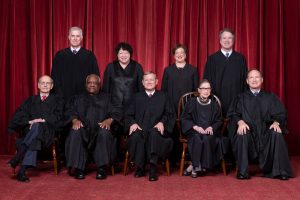Adult Attorney Larry Walters: Industry “Should Pay Close Attention” to Trademark Case
 WASHINGTON – When the U.S. Supreme Court issued its decision in Matal v. Tam back in June 2017, under which the court held that the “Disparagement Clause” of the Lanham Act violated the Free Speech Clause of the First Amendment, many observers hoped the ruling was the first step toward the end of the Lanham Act’s prohibition of “immoral” and “scandalous” marks, as well.
WASHINGTON – When the U.S. Supreme Court issued its decision in Matal v. Tam back in June 2017, under which the court held that the “Disparagement Clause” of the Lanham Act violated the Free Speech Clause of the First Amendment, many observers hoped the ruling was the first step toward the end of the Lanham Act’s prohibition of “immoral” and “scandalous” marks, as well.
A case now pending before the Supreme Court, Iancu v. Brunetti, will test the “Scandalous Clause” in the same way Tam put the Disparagement Clause under scrutiny. The case arose when Erik Brunetti tried to register the word mark “FUCT” in connection with a line of clothing he designed. Brunetti’s registration was rejected by the U.S. Patent and Trademark Office (USPTO) on the basis of the Scandalous Clause and Brunetti appealed to the U.S. Court of Appeals for the Federal Circuit.
In December 2017, the court of appeals issued a unanimous opinion finding unconstitutional Section 15 U. S. C. §1052(a) of the Lanham Act. The USPTO petitioned for certiorari from the Supreme Court, seeking to restore the ban on scandalous and immoral marks. On January 4, 2019, the court granted certiorari to the USPTO. Brunetti did not oppose the grant of certiorari, in part because “the questions presented are of great importance to the Government, other trademark owners, the public, and to Brunetti.”
The questions before the court, as expressed in Brunetti’s brief, are as follows: “Whether Section 1052(a)’s prohibition on the federal registration of ‘immoral’ or ‘scandalous’ marks is facially invalid under the Free Speech Clause of the First Amendment” and “Whether Section 1052(a)’s prohibition on the federal registration of ‘immoral’ or ‘scandalous’ marks is unconstitutionally vague under the First and Fifth Amendments.”
In the brief, Brunetti argues that “no principled reason exists for distinguishing the Disparagement Clause from the Scandalous Clause as to whether the refusal to register is a constitutionally relevant restriction on speech.”
Brunetti also notes that the government “defends the Scandalous Clause on the grounds that it is not a complete prohibition of use,” but argues this defense “ignores an important point.”
“If the Scandalous Clause were constitutional, then what else could the Government lawfully prohibit?” Brunetti asks. “Certainly, it would follow that the Government could constitutionally refuse registration of copyright for scandalous works. State and local governments could effectively block unpopular organizations advancing controversial causes (i.e., causes that are scandalous to at least a portion of the public) by refusing to grant building permits, charitable solicitation registrations, business licenses, or sales tax permits. This is no hypothetical concern.”
While the government interprets the Scandalous Clause to be “limited only to marks that contain profanity, excretory or sexual matter” and is therefor content-neutral, Brunetti argues this isn’t the case, and that the clause “results in refusal of trademarks based upon viewpoint.”
“The Government claims it is just regulating content and not viewpoint because, it contends, it is only refusing to register profanity, excretory and sexual matter,” Brunetti notes. “However, that is not true, the Government refuses to register some profanity, excretory and sexual content, and allows some. The basis for deciding whether to allow registration is how offensive the profanity, excretory or sexual matter is. A mark is refused if ‘it would be considered offensive by a substantial portion of the public.’” (Italicized emphasis in original brief.)
The brief then cites specific examples of profanity, excretory and sexual content the government will permit in trademarks, before circling back around to the implications of the government’s selective approach to allowing such marks.
“In short, the Scandalous Clause is not a content-neutral rule that rejects all profanity, excretory and sexual content,” Brunetti asserts. “Instead, the Government is selectively approving or refusing profanity, excretory and sexual content based upon the level of perceived offensiveness. Tam held unanimously that the Disparagement Clause was unconstitutional because it ‘offends a bedrock First Amendment principle: Speech may not be banned on the grounds that it expresses ideas that offend.’”
Attorney Larry Walters told YNOT the Brunetti case is one to which the adult industry “should pay close attention.”
“We have USPTO applications for clients currently on hold pending the final resolution of Brunetti,” Walters said. “Companies with sexually explicit brand names should consider filing their applications so they can get their place in line.”
As for the outcome of the case, Walters said he agrees with the assertions made by Brunetti – and the court should rule accordingly.
“I believe the prohibition violates the First and Fifth Amendments, and it should fall under the same reasoning used by the Court in Tam,” he said.
As Walters noted in an article he published following the Tam decision, the adult industry has for years “accepted this fate” of not being able to register potentially scandalous and immoral marks, instead using “mainstream, non-offensive brand names for its products and services when it wanted to obtain trademark protection.”
In the same article, Walters persuasively argued that the prohibition on such marks was unnecessary – in large part because the public and free market are perfectly capable of deciding whether a company’s or person’s marks are so objectionable as to be unworthy of their patronage.
“The marketplace of ideas will not crumble if some company decides to use a ‘dirty word’ in their trademarked brand,” Walters wrote. “Consumers will either accept or reject their products or services. That is how the marketplace is designed. For years, the USPTO artificially put its thumb on the scale of morality, and decided which brands it liked, and which it did not. The day is coming where trademark owners will no longer be corralled into a homogeneous, milquetoast pit of the mundane. Instead, the gates of creativity may soon be opened, where businessmen can decide for themselves whether their brand name should be salty or sweet.”













